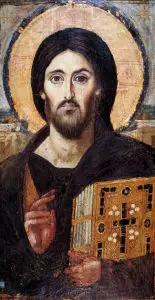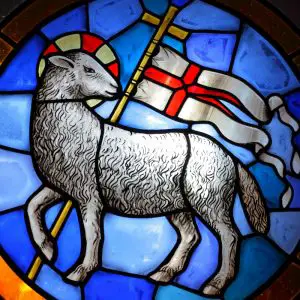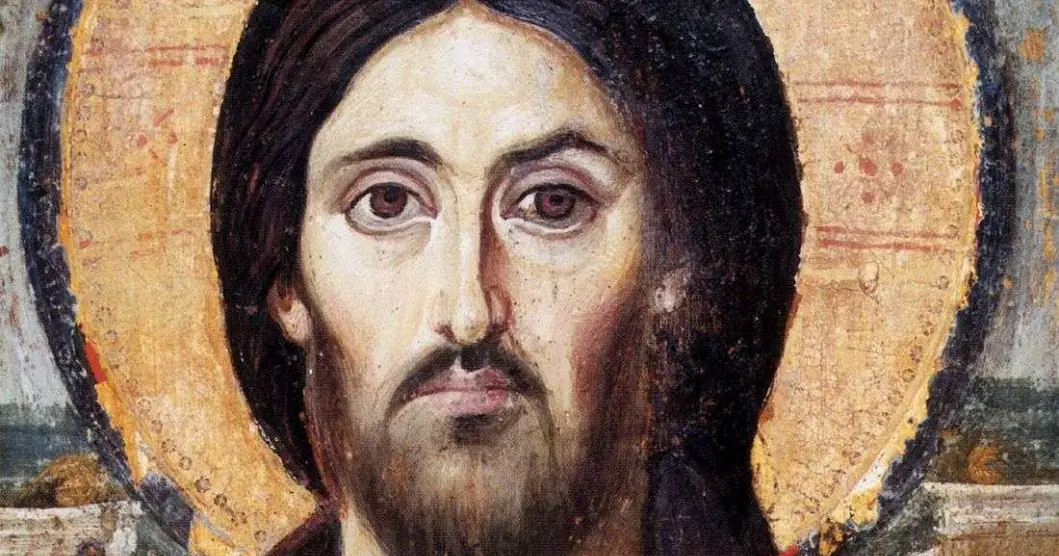Who is the Almighty God? Does the title refer to the Trinity–the Father, Son, and Holy Spirit–as orthodoxy requires? Or does Scripture provide a different answer? Let’s examine the definition of the word almighty, as well as its usage in Scripture and in creedal history.
What does Almighty mean?
The first occurrence of the word almighty in Scripture is found in the book of Genesis:
Genesis 17:1 (NASB) Now when Abram was ninety-nine years old, the LORD [Yahweh] appeared to Abram and said to him, “I am God Almighty; Walk before Me, and be blameless. (emphasis added)
 God revealed Himself to Abram as God Almighty, which in Hebrew is the phrase El Shadday (or El Shaddai). The word Shadday (or Shaddai) means Almighty, and it is translated as such in each of its forty-eight Old Testament occurrences. According to the Expository Dictionary of Bible Words, it “is used exclusively as a divine name.”[1] In addition to Abram (Abraham), two other patriarchs, Isaac and Jacob, also knew God by this name, as did Jacob’s son, Joseph.[2]
God revealed Himself to Abram as God Almighty, which in Hebrew is the phrase El Shadday (or El Shaddai). The word Shadday (or Shaddai) means Almighty, and it is translated as such in each of its forty-eight Old Testament occurrences. According to the Expository Dictionary of Bible Words, it “is used exclusively as a divine name.”[1] In addition to Abram (Abraham), two other patriarchs, Isaac and Jacob, also knew God by this name, as did Jacob’s son, Joseph.[2]
The Greek equivalent to Shaddy is Pantokrator (or Pantocrator) which comes from the words pas, meaning all or every, and kratos which means power, dominion, strength, mighty.[3] Pantokrator appears ten times in the New Testament, and it is translated as almighty each time. HELPS Word Studies further defines Pantokrator as unrestricted power exercising absolute dominion.[4] Moreover, The Complete Word Study Dictionary affirms that it is “spoken only of God.”[5] Now that we understand the definition of Almighty, let’s look more closely at its Biblical usage.
Who does Almighty refer to?
The Athanasian Creed of the fifth century[6] portrays the Father, Son, and Holy Spirit as each being Almighty God. Nonetheless, it maintains that this does not create three Almighty beings, as one would reason, but only one being.[7] (This declaration, of course, is not accompanied by an explanation, Scriptural or otherwise, as to how three separate Almighty’s can remain only one Almighty.) Although not all churches recite this particular creed, nevertheless, the vast majority adhere to the tenets therein. If, as the creed states, the Father, Son, and Spirit are each deemed to be Almighty, we should be able to find it stated in Scripture.
The Almighty in the Old Testament
Each time the word Shadday appears in the Old Testament, it is in reference to God. The Jews of antiquity undeniably understood that the Almighty was God the Father and that He was only one God.[8] They never received any instruction or explanation that their singular God was actually a triune being. Indeed, Trinitarian apologist, Robert M. Bowman, Jr., concedes that even the concept of a triune God is not to be found in the Old Testament:
All trinitarians agree that the ideas about God expressed in the doctrine of the Trinity are not found directly in the Old Testament.[9] (emphasis added)
Moreover, the Encyclopedia of Religion and Ethics states:
There is in the Old Testament no indication of distinction in the Godhead; it is an anachronism to find either the doctrine of the Incarnation or that of the Trinity in its pages.[10] (emphasis added)
Christian apologist and speaker, Don Stewart, helps us understand why God is not understood to be a plurality of persons in the Old Testament:
The doctrine of the Trinity was not clearly formulated until after the New Testament was written… The doctrine of the Trinity is not plainly revealed in the Old Testament.[11] (emphasis added)
More specifically, Edmund J. Fortman, Jesuit priest and professor of theology and philosophy, conveys that the Old Testament’s authors had not even the slightest idea that God was three in one, nor was there even an implication therein:
The Old Testament tells us nothing explicitly or by necessary implication of a Triune God who is Father, Son and Holy Spirit…. There is no evidence that any sacred writer even suspected the existence of a [Trinity] within the Godhead…. Even to see in the Old Testament suggestions or foreshadowings or ‘veiled signs’ of the Trinity of persons is to go beyond the words and intent of the sacred writers.“[12]
Thus, all of the forty-eight times Almighty is used in the Old Testament, it is used with God the Father in mind since this is who its authors and audience understood Him to be based on His self-revelation.
The Almighty in the New Testament

What about the New Testament? Is there a reference to God the Father, Jesus, or the Holy Spirit as the Almighty within its pages? Of the ten occurrences of Pantokrator (Almighty), only one appears outside the book of Revelation:
2 Corinthians 6:18 (NASB) “And I will be a father to you, and you shall be sons and daughters to Me,” Says the Lord Almighty. (emphasis added)
Here Paul is instructing believers not to be bound together with unbelievers. He reasons, “what harmony has Christ with Belial, or what has a believer in common with an unbeliever?”[13] He then goes on to quote God as saying, “‘I will be a father to you…,” says the Lord Almighty.” Thus, for Paul, the Almighty is God the Father whereas, Jesus is the Christ. This is not surprising considering that Paul writes to the same audience that the Father is exclusively God:
1 Corinthians 8:5-6 (NASB) For even if there are so-called gods whether in heaven or on earth, as indeed there are many gods and many lords, 6 yet for us there is but one God, the Father, from whom are all things and we exist for Him; and one Lord, Jesus Christ, by whom are all things, and we exist through Him. (emphasis added)
In Paul’s understanding, and thus in his teaching, there is only one God, the Father; this is to the exclusion of the Son and the Spirit.
The remaining nine occurrences of Pantokratôr appear in the book of Revelation. Space does not permit us to examine each of the passages here, however, two of the verses set a clear standard by which we may interpret the rest.
Who is the Almighty in Revelation?
Chapter 19 of Revelation records the triumphant arrival of Jesus, the victorious king of kings and the instrument of God’s justice:
Revelation 19:14-16 (NASB) And the armies which are in heaven, clothed in fine linen, white and clean, were following Him on white horses. 15 From His mouth comes a sharp sword, so that with it He may strike down the nations, and He will rule them with a rod of iron; and He treads the wine press of the fierce wrath of God, the Almighty. 16 And on His robe and on His thigh He has a name written, “KING OF KINGS, AND LORD OF LORDS.” (emphasis added)
Here John differentiates between God the Almighty, who is full of fierce wrath, and Jesus, the king of kings and lord of lords[14] who metes out that wrath. One is termed the Almighty, the other is not.
The last passage we’ll examine offers the clearest answer to the question: Who is the Almighty in the New Testament?
Revelation 21:22 (NASB) I saw no temple in it, for the Lord God the Almighty and the Lamb are its temple. (emphasis added)

John clearly differentiates between God, who is the Almighty, and the one whom he calls the Lamb. John’s gospel account informs us that Jesus is the Lamb:
John 1:29 (NASB) The next day he *saw Jesus coming to him and *said, “Behold, the Lamb of God who takes away the sin of the world! (emphasis added)
To be sure, the Jesus is the Lamb of God, not God the Lamb.
In spite of this clear evidence, some may offer Revelation 1:8 as proof that Jesus is called the Almighty in Scripture:
Revelation 1:8 (NASB) “I am the Alpha and the Omega,” says the Lord God, “who is and who was and who is to come, the Almighty.” (emphasis added)
According to some translations, Jesus is the one speaking in this verse, as evidenced by the red letters used to indicate that the words belong to Jesus. Upon closer examination, however, the context reveals it is God the Father who is speaking. For example, in verse one, we read that it was God who gave the revelation to Jesus to share with his bond-servants. In verse two, John sends a greeting from God whom he designates as “Him who is and who was and who is to come” and from Jesus, who is designated as the Christ. Thus, John makes a clear distinction between the two:
Revelation 1:4-5 (NASB) John to the seven churches that are in Asia: Grace to you and peace, from Him who is and who was and who is to come, and from the seven Spirits who are before His throne, 5 and from Jesus Christ, the faithful witness, the firstborn of the dead, and the ruler of the kings of the earth. To Him who loves us and released us from our sins by His blood—
In verse six we read that Jesus has made us priests to his God and Father.
Revelation 1:6 (NASB) and He [Jesus, verse 5] has made us to be a kingdom, priests to His God and Father—to Him be the glory and the dominion forever and ever. Amen. (emphasis added)
Indeed, Scripture records at least twenty times that Jesus has a God! And it is this God that concludes His greeting by declaring His authority as the Almighty in verse eight, and by repeating His claim from verse four to be the one “who is and who was and who is to come.”
Revelation 1:8 (NASB) “I am the Alpha and the Omega,” says the Lord God, “who is and who was and who is to come, the Almighty.” (emphasis added)
Although God the Father and Jesus are both referred to as the Alpha and the Omega,[15] scholars agree that this is not a designation of deity. The phrase alpha and omega, the first and last letters of the Greek alphabet, is considered by some to represent “the beginning” and “the end.” Therefore, it cannot be a reference to deity because God, who is eternal, certainly has no beginning and or end.[16]
Just as in the Old Testament, the title Almighty is used exclusively of God the Father in the New Testament, and never of Jesus or the Holy Spirit.
The History of the Creeds
But what about the Athanasian Creed which states that the Father, Son, and Holy Spirit are each Almighty? Most believers are unaware that the two earliest known creeds, which predate the Athanasian Creed by possibly three hundred years, are in agreement with Scripture that God the Father is the Almighty.
The Old Roman Creed, (c. early 2nd century):
I believe in God the Father almighty;
and in Christ Jesus His only Son, our Lord,
Who was born from the Holy Spirit and the Virgin Mary…[17] (emphasis added)
The Apostle’s Creed (c. mid to late 2nd century) [18]:
I believe in God, the Father Almighty,
the Creator of heaven and earth, and in Jesus Christ, His only Son, our Lord…The third day He arose again from the dead. He ascended into heaven and sits at the right hand of God the Father Almighty…[19] (emphasis added)
Charles Morgridge, author and minister, writes:
The Apostle’s Creed (so called) has not a word about the Trinity. It is strictly Unitarian. It calls no person God, but the Father. It calls no person Almighty, but the Father. It ascribes the creation of heaven and earth to no person but the Father.[20] (emphasis added)
While Morgridge’s assessment pertains to the Apostles’ Creed, the same could be said for the Old Roman Creed.
Conclusion
Although orthodoxy may declare Jesus to be the Pantocrator, the Almighty, along with the Holy Spirit and God the Father, such a claim lacks Scriptural evidence. Moreover, as the creedal statements reveal, the early Church professed God the Father alone to be the Almighty. It wasn’t until the post-Biblical doctrine of the Trinity, which evolved over considerable time, that the term became inclusive of Jesus and the Spirit.
Professor and respected scholar, Larry Hurtado, offers his evaluation:
No where in the early church do people say Jesus is God Almighty. Pantocrator (ruler of all or Almighty, All Powerful) is always reserved for God until the Byzantine period. So in the first several centuries, Pantocrator, Almighty, is a term that is reserved for God the Father. It is never applied to Christ.[21] (emphasis added)
One must decide if the inspired Scriptures are sufficient for determining doctrine,[22] or if the post-Biblical beliefs that developed among the Platonic-inspired Church Fathers present an acceptable matrix by which we view God. A cautionary word must be offered, however: surely there are significant consequences for knowingly rejecting the creed of Jesus, and the doctrine of God that he espoused:
Mark 12:28-29 (NASB) One of the scribes came and heard them arguing, and recognizing that He had answered them well, asked Him, “What commandment is the foremost of all?” 29 Jesus answered, “The foremost is, ‘HEAR, O ISRAEL! THE LORD OUR GOD IS ONE LORD (emphasis added)
John 17:1 and 3 (NASB) Jesus spoke these things; and lifting up His eyes to heaven, He said, “Father…3 “This is eternal life, that they may know You, the only true God, and Jesus Christ whom You have sent. (emphasis added)
[1] Expository Dictionary of Bible Words, Stephen D. Renn, ed., (Peabody, MA: Hendrickson Publishers, 2006) p. 27
[2] Genesis 28:1-3; 35:11; 48:3; Exodus 6:2-3.
[3] Strong’s Greek Dictionary #2904 kratos
[4] https://biblehub.com/greek/3841.htm
[5] Spiros Zodhiates, The Complete Word Study Dictionary: New Testament (AMG International, 1993), p. 1093-1094.
[6] Most scholars agree that the Athanasian Creed was not written by Athanasius (d. 373), and many date its origin to the fifth century. Some suggest it was written by Vincent of Lérins (c. 440) or one of his admirers. Britannica.com, accessed 1-4-20, https://www.britannica.com/topic/Athanasian-Creed
[7] http://www.newadvent.org/cathen/02033b.htm
[8] Deuteronomy 6:4 was the national creed, if you will, of Israel: “Hear, O Israel! The LORD is our God, the LORD is one!”
[9] Robert M. Bowman, Jr., Why You Should Believe in the Trinity: An Answer to Jehovah’s Witnesses (Grand Rapids, MI: Baker Book House, 1989), p.22.
[10] Encyclopedia of Religion and Ethics, ed. James Hastings, (Edinburgh: T. & T. Clark, Vol. 6, 1919), p. 254
[11] Is the Doctrine of the Trinity found in the Old Testament? Blue Letter Bible online. Accessed March 5, 2019. https://www.blueletterbible.org/faq/don_stewart/don_stewart_330.cfm
[12] Edmund J. Fortman, The Triune God: A Historical Study of the Doctrine of the Trinity, (Baker Book House, 1972), p. xv, 8, 9.
[13] 2 Corinthians 6:14-15.
[14] “King of Kings, and Lord of Lords,” this is not an indicator of deity. While God is called by the same title in 1 Timothy 6:13-16, others have been given this name as well. For example, King Nebuchadnezzar in Daniel 2:27 and Ezekiel 26:7, and King Artaxerxes in Ezra 7:12, are both referred to as king of kings. Indeed, Semitic languages often use the genitive case (when a noun modifies a noun) to describe something they thought was the “best” or “highest” or “greatest.” For instance, before King Nebuchadnezzar understood who God really was, he called Him the “god of gods” because Daniel’s god was the only god who could interpret dreams. Thus, in Revelation when Jesus is called the king of kings and lord of lords it’s because he was exalted by God as the ultimate king and lord, not because he is God, himself. Jesus even testified that God the Father was the greater of the two. See Acts 2:36; Philippians 2:9-11; Ephesians 1:17-23; 1 Corinthians 15:23-28; John 14:28.
[15] God: Revelation 1:8 and 21:6. Jesus: Revelation 22:13.
[16] An alternative view of the meaning of Alpha and Omega: “Norton writes that these words, ‘denote the certain accomplishment of his purposes; that what he has begun he will carry on to its consummation.’” (A Statement of Reasons for Not Believing the Doctrines of Trinitarians; 1877, pp. 479, 480), https://www.biblicalunitarian.com/verses/revelation-1-8
[17] https://godwords.org/church-history/creeds-and-statements-of-faith/old-roman-creed/
[18] Although called the Apostles’ Creed, it was not penned by any of the twelve apostles, and was thought to have been written about 150 AD, long after they had all expired. Many consider it to be based on the Old Roman Creed
[19] https://godwords.org/church-history/creeds-and-statements-of-faith/the-apostles-creed/
[20] Charles Morgridge, True Believer’s Defense Against Charges Preferred by Trinitarians For Not Believing in the Divinity of Christ, The Deity of Christ, the Trinity, (New Bedford, 1837), p. 162-63.
[21] Larry Hurtado, from a lecture entitled, “Paul’s Messianic Christology” accessed 1-4-20. Quote begins at 1:34:16. https://www.youtube.com/watch?v=QhgwyopHis0&t=1860s




Since only God is to be worshiped, Jesus is the Almighty since He is the proper recipient of worship.
Hi Marc,
Thanks for taking the time to stop by the website.
First, as I stated in the article, Jesus is never called Almighty in Scripture.
Second, while space does not allow me to give a detailed answer, I will say that worship, whether in Hebrew (shachah), Greek (proskuneo) or Aramaic (segid), means to bow down, prostrate oneself, to pay homage, to do reverence. The term is what one offers to one’s superior (i.e., master or lord), monarchs, or others deemed deserving of reverence, such as deity, whether false gods or the one true God. Thus, when Scripture speaks of someone or something as being worshiped, we must look to the context to determine the reason.
There are numerous instances in Scripture where non-deities receive shachah and proskuneo. For example:
1 Chronicles 29:20 (NASB) Then David said to all the assembly, “Now bless the Lord your God.” And all the assembly blessed the Lord, the God of their fathers, and bowed low [qadad] and did homage [shachah] to the LORD and to the king.
Notice that the people offered homage to both the LORD and to the king. They worshiped Yahweh as God and the king as God’s anointed ruler. The same act was applied to both, but the reason for paying homage was different. Note also that King David did not refuse their worship as he understood that they were revering him as the king of Israel and not because they believed him to be deity.
Another example is found in Jesus’ comments to the church in Philadelphia:
Revelation 3:9 (KJV) Behold, I will make them of the synagogue of Satan, which say they are Jews, and are not, but do lie; behold, I will make them to come and worship [proskuneô] before thy feet, and to know that I have loved thee.
Jesus is going to force those of Satan’s synagogue to worship (pay homage, reverence, honor, etc.) the saints in Philadelphia, not because they are deity, but because they persevered in the faith. The verb here is the same for worshiping God the Father (John 4:21-24), but the motive is different.
Thus, the question is not, is Jesus worshiped, but why is he worshiped? My position and I believe the Scriptural one, is that, like King David, Jesus is worshiped as God’s anointed Messiah, the coming king. Also, we see in Phil. 2:9-11 that God exalted Jesus and gave him the highest name, not because he is God, but because of his obedience to God, even unto death. “For this reason” every knee will bow and tongue confess that Jesus Christ is Lord to the glory of God the Father. Indeed, Acts 2:36 says God made Jesus both Lord and Christ.
The disciples understood Jesus to be the Messiah and they worshiped him as such. For example, after Jesus and Peter walked on water and returned to the boat, the disciples worshiped him:
Matthew 14:33 (NASB) And those who were in the boat worshiped [proskuneô] Him, saying, “You are certainly God’s Son!”
They worshiped Jesus as God’s Son or the Son of God, a Messianic designation and not one of deity (see John 1:49; also my post on the Son of God.)
In John’s apocalyptic vision, those in heaven worshiped Jesus because he is the Lamb of God (not God the Lamb) who purchased FOR God, men from every tribe…with his blood (Rev. 5:9-10).
Thus, according to the Bible, both man and God may rightfully receive worship (shachah; proskuneo). The act of paying homage, etc., is the same. The context and an unbiased interpretation is what is needed to determine the reason for the worship.
So far, this is the most accurate explanation on the act of worship.
Thanks for your comment!
God bless,
OGW
Bravo! This is scriptural. . .
Thanks for reading and commenting! Appreciate the encouragement!
Agree 100% with what I understood!
Good to know. Thanks.
OGW
Not sure why you left out Rev. 1: 17 Where Jesus says to John, I am the first and the last, which is exactly what you say is God Almighty speaking in verse 8., I am the Alph and the Omega. THe beginning and the end. So either we have two first and last (according to your interpretation or just one, which is Jesus, who is Almighty God, the Son. I guess you would have picked up stones to kill Jesus too along with the Jews in John 8 where he told the Jews before Abraham was, I am! THey understood his claim “he was speaking blasphemy”, and unfortunately, you don’t. He is the great I am, not a lessor I am. BUt one and the same being.
Hello Monty,
Thanks for reading and commenting. As for John 8, please take a few minutes to read this article which provides a better understanding of the Greek ego eimi, translated I am. I think you will find it interesting, if not compelling.